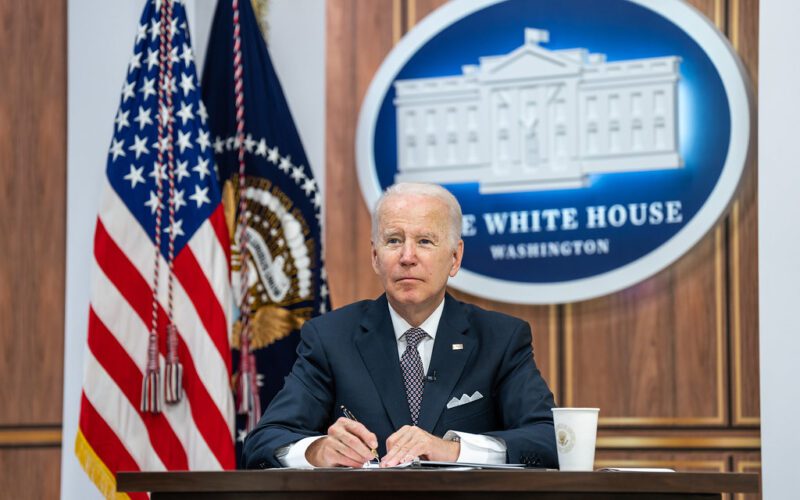? Good morning, and welcome to The Yappie’s AAPI politics briefing — your guide to the policy news and activism affecting Asian Americans + Pacific Islanders. Send tips and feedback to [email protected] and support our work by making a donation.
— Edited by Shawna Chen and Mary Yang
The Biden Era


?️ WHITE HOUSE HOSTS HATE CRIMES SUMMIT: President Joe Biden hosted the United We Stand Summit on the anniversary of the 2001 killing of Balbir Singh Sodhias part of the administration’s broader goal to combat hate crimes. The summit agenda featured a wide range of speakers, including religious leaders, family members of hate crime victims, and community leaders from organizations such as Unidos Bridging Community, AAPI Youth Rising, Multi-Faith Neighbors Network, and the One America Movement.
- Cross-sector engagement: Two new initiatives were formed at the summit. A Nation of Bridgebuilders will attempt to build diverse ties among Americans in partnership with Interfaith America, Habitat for Humanity, and the YMCA, while Dignity.us will bring together former White House Domestic Policy Council directors and presidential foundations from both Democratic and Republican administrations to research hate-fueled violence.
- Role of Big Tech: The Biden administration also announced that several tech companies—including YouTube, Twitch, Microsoft, and Meta—have committed to researching, detecting, and/or combating the spread of violent ideologies on their respective platforms.
- Worth noting: Ongoing struggles with attempts to regulate the tech industry, including a Senate bill proposed earlier this year, have left many skeptical of the federal government’s ability to ensure companies do their part in fighting hate.
? CDC’S MASKING UPDATE LAMBASTED: Asian American disability activists are slamming the Biden administration after the Centers for Disease Control and Prevention (CDC) quietly issued a Friday update relaxing mask mandates in hospitals and nursing homes. Over a quarter of counties can now “choose not to require” masks in health care facilities, CBS News’ Alexander Tin writes.
- In their words: “Society has decided to run head on into long COVID and disability,” tweeted Mia Ives-Rublee, director of the Disability Justice Initiative at the nonpartisan policy institute Center for American Progress.
- Don’t forget: CDC Director Rochelle Walensky took heat in January for saying “we’re really encouraged” by study results showing that the majority of vaccinated people dying from COVID are those “who were unwell to begin with.” Shortly after, Disability Visibility Project founder Alice Wong criticized government leaders for talking about people with severe illnesses “as if they’re a write-off.”
- “What is valued in our society? Clearly, someone who can walk and talk and has zero comorbidities, she told California Healthline’s Rachel Scheier. “It is an ideology, just like white supremacy.”
- Months later, that sentiment has reared its head again with the CDC’s latest move, with many disabled people pointing out its proximity to midterm elections and calling it politically motivated.
?️ PACIFIC ISLANDER LEADERS SPEAK OUT AHEAD OF SUMMIT: As Biden prepares to host the inaugural U.S.-Pacific Island Country Summit this week, leaders of Pacific Island nations and territories convened at the 12th Pacific Island Conference of Leaders in Honolulu. Across the board, they’re demanding more support for Pacific Islander priorities, per Anita Hofschneider forthe Honolulu Civil Beat.
- Looming threats: In a closed-door meeting, leaders called for the Biden administration to focus attention on climate change as the most urgent security task in the region rather than competition between China and the U.S. They also highlighted the need for financing climate change mitigation and adaptation, and urged the U.S. to adopt the 2050 Strategy for the Blue Pacific Continent, which addresses regionalism, peace and security, economic development, and technology, among other target areas.
- Red flag? The Biden administration continues to face criticism for excluding the Cook Islands, Niue, New Caledonia, and French Polynesia from its summit invite list.
⚖️ XIAOXING XI CHALLENGES GOVERNMENT DISCRIMINATION: Oral arguments began earlier this month in the case of Xiaoxing Xi, a Chinese American physics professor at Temple University.
- Context: In 2015, FBI agents forcibly entered Xi’s home and falsely accused him of sharing sensitive technology with Chinese scientists—an accusation for which Xi faced up to 80 years in prison and $1 million in fines, according to NBC Asian America’s Kimmy Yam. The Department of Justice eventually dropped the charges after leading scientists provided evidence that the information he shared did not cover sensitive tech.
- Xi’s case illustrates a broader fear of government discrimination against Chinese American scientists and academics amid rising geopolitical tensions between the U.S. and China.
- Don’t forget: The Biden administration ended the Trump-era “China Initiative,” which was aimed at targeting Chinese economic espionage, earlier this year after a number of scholars, scientists, lawmakers, and advocates decried the program for allegedly encouraging racial profiling and discrimination.
- AAPI community converges: Xi originally sued the U.S. government in 2017 and filed an appeal in February after a district court dismissed his case in 2021. Shortly thereafter, Asian Americans Advancing Justice – AAJC and Asian Law Caucus submitted an amicus brief signed by 72 Asian American organizations, scientific groups, and associations in support of Xi.
MAKING MOVES: Longtime Virginia General Assembly Delegate Mark Keam (D), who represented the state’s 35th district for 13 years, has resigned from his position to accept a new role as deputy assistant secretary for travel and tourism in the International Trade Administration.
On The Hill


? SEEKING AN END TO REFUGEE DEPORTATIONS: Asian American advocates have launched a campaign to pass the Southeast Asian Deportation Relief Act in Congress after Rep. Alan Lowenthal (D-California) introduced the bill last week. The legislation, which includes Reps. Judy Chu (D-California) and Pramila Jayapal (D-Washington) as co-leads, would end the deportation of Southeast Asian refugees who came to the U.S. after fleeing the Vietnam War, Khmer Rouge genocide, and Secret War in Laos.
- How it’d work: The bill would limit the Department of Homeland Security’s ability to detain or deport Southeast Asian refugees who relocated to the U.S. prior to 2008. It would also end in-person check-ins with Immigration and Customs Enforcement—something that has long incited anxiety among refugees—and authorize permanent employment eligibility with a five-year renewal period.
- If passed, the bill would offer protections to an estimated 15,000 refugees, many of whom suffer what advocates call the “double punishment” when they face final orders of removal and deportation after completing time in prison for crime convictions, NBC Asian America’s Kimmy Yam writes. It’s worth noting that Southeast Asian refugees were largely set up to fail when they were forced to resettle in the U.S. with little assistance.
- Read more on “double punishment”: Inside the campaign to end California's prison-to-deportation pipeline, by The Yappie’s Samson Zhang and Katelyn Monaco.
✈️ DEMOCRATS URGE DOJ PROBE INTO MIGRANT FLIGHTS: Rep. Ted Lieu (D-California) co-led a letter last week calling on the Department of Justice to open an investigation into Florida Gov. Ron DeSantis’ (R) “cruel” transport of undocumented migrants at the border. The letter, signed by 47 lawmakers, highlights the migrants’ status as asylum seekers fleeing the Maduro regime in Venezuela.
- “The migrants who were used in this political stunt were fleeing communism, authoritarianism, and violence, having crossed 10 countries and walked thousands of miles in search of a dignified life for them and their families,” the letter states. “The actions of the officials in Texas and Florida were not only fundamentally cruel and uniquely un-American; there remains a likelihood that federal laws were violated.”
- New allegations: The letter comes after a migrant told the San Antonio Report’s Raquel Torres that someone known as “Perla” paid him $200 in cash to recruit other migrants to board the charter flights.
- Finger on the pulse: Though the migrants flown to Martha’s Vineyard are mostly Venezuelan, the U.S.-Mexico border has also seen a surge in Asian migrants in the last few years—especially Indians, The Guardian’s Arya Sundaram notes. It’s unclear how they’ve fared as GOP governors continue to send thousands of migrants to Democratic-run cities.


? PRABHAKAR CONFIRMED AS OSTP CHIEF: In a 56-40 vote last week, the Senate confirmed Arati Prabhakar as director of the White House Office of Science Technology and Policy (OSTP).
- Making history: Prabhakar, who was the first woman to serve as director of the National Institute of Standards and Technology, is now the first woman and person of color to lead the OSTP, The Yappie’s Samson Zhang reports.
? ONE FUN THING: Reps. Young Kim (R-California) and Lou Correa (D-California) “brewed up bipartisanship” at the Anheuser-Busch’s annual “Brew Across America” competition last week, jointly submitting a green tea lemon shandy called the Emerald Palmer, Spectrum News’ Cassie Semyon writes in a dispatch. (Spoiler alert: They didn’t take home the trophy.)
2022 Watch


?️ LANHEE CHEN WANTS TO BE CALIFORNIA’S NEXT CONTROLLER: Seeking to replace termed-out Democrat Betty Yee as California’s chief fiscal officer, Chen, a prominent GOP policy advisor and attorney, will face Democrat Malia Cohen, the chair of California’s Board of Equalization, in the race for state controller this November. Yee’s successor will hold the powerful post of overseeing all state funds—from schools and housing projects to public agencies.
- What we’re watching: Chen, a Bay Area resident with roots in Southern California, is the son of Taiwanese immigrants and would be the third Asian American in a row—following Yee and former California Treasurer John Chiang—to manage the state’s bank account. “The dearth of Asian American elected officials and candidates at the statewide level is a function of the fact that the pipeline has been pretty narrow,” Chen told POLITICO’s Marissa Martinez. “And we have to widen that pipeline.”
- Across the aisle: Chen, who is running as a Republican, has served in senior positions for several GOP lawmakers—including as policy advisor to Utah Sen. Mitt Romney’s 2012 presidential campaign. But he also served a stint in the White House during the Obama administration as a member of the independent Social Security Advisory Board.
- Media’s Man: Chen has reined in endorsements from several editorial boards across the state, including the Los Angeles Times, the Orange County Register, and the San Diego Union-Tribune.
MCCARTHY MAKES BID TO DIVERSIFY GOP: The Republican Party is running over 60 people of color as nominees for House races across the country as House Minority Leader Kevin McCarthy (R-California) looks to match the U.S.’s rapidly diversifying population, Axios’ Sophia Cai reports.
- Challengers and incumbents combined, that includes six AAPI, 29 Latino, 26 Black, and at least three Indigenous candidates.
? HAWAIʻI FINES KAI KAHELE FOR ILLEGAL SOLICITATION: The Hawaiʻi Campaign Spending Commission has issued a $1,000 fine to former gubernatorial candidate and U.S. Rep. Kai Kahele’s (D-Hawai‘i) campaign for illegally seeking donations from lists of people who had contributed to Gov. David Ige’s (D) 2014 run for office, Honolulu Civil Beat’s Blaze Lovell reports.
- Remember: Kahele’s exit from the U.S. House of Representatives to pursue his bid for governor came with the loss of the only Native Hawaiian voice in Congress. Kahele, considered a “rising star,” came in third behind Lt. Gov. Josh Green and former Hawaiʻi First Lady Vicky Cayetano in August’s Democratic primary.
? ON OUR RADAR—$10M MIDTERM MOBILIZATION: A progressive coalition of Asian American organizations called the Asian American Power Network is spending $10 million in the latest effort to encourage Asian Americans in battleground states to vote come November, reports Katie Glueck of the New York Times. In Pennsylvania, for example, the group plans to conduct voter outreach in 15 languages, reports NBC News’ Zachary Schermele.
- AAPIs on the rise: Nearly 60% of eligible Asian Americans and 56% of eligible Pacific Islanders turned out to vote in 2020, up from 49% and 41% in 2016, respectively, according to AAPI Data. “In key battleground states, [AAPIs] have become the margin of victory,” said APIAVote Executive Director Christine Chen.
AAPI Nation


? NUMBER OF THE WEEK—8: That’s the percentage of Asian American, Native Hawaiian, and Pacific Islander adults in California who have faced a hate incident due to COVID-19, according to preliminary data from UCLA’s Center for Health Policy Research. In 2020, 4% of AANHPIs said they had been treated unfairly due to their race or ethnicity, according to Ninez Ponce, UCLA CHPR director.
? Here's what else is happening across America…
A new Hawai‘i law will give Native Hawaiians more governing power over Mauna Kea, a sacred and culturally significant mountain on Big Island and the site of several telescopes that have contributed to discoveries in astronomy. Native Hawaiian activists Lanakila Mangauil and Noe Noe Wong-Wilson are two of eight people appointed to the newly established Mauna Kea Stewardship and Oversight Authority, the Associated Press’ Audrey McAvoy reports.
Chinese American disability activist and writer Alice Wong, who was born with muscular dystrophy and uses a ventilator to assist with breathing, tells all in her new memoir “Year of the Tiger,” writes Washington Post's Anna Leahy. Wong, born a decade before the Americans with Disabilities Act became law in 1990, chronicles the discrimination she faced as a student and the experiences that led her to create the Disability Visibility Project, which she founded in 2014 to “[amplify] disability media and culture.”
Activists from Hawai‘i rallied in front of the White House last week to keep up pressure on the federal government to shut down Red Hill, a U.S. Navy-run fuel storage facility on O‘ahu where a leak last year contaminated the water supply and harmed thousands on the island, Honolulu Civil Beat’s Nick Grube reports.
This week marks 15 years since Congress established the Asian American and Native American Pacific Islander-Serving Institutions (AANAPISI) program, which aims to increase access to quality postsecondary education for low-income, first-generation AAPI students.
Asian Americans and Pacific Islanders have seen the largest gains in state legislatures among first- and second-generation U.S. immigrants since 2020, writes NextShark's Carl Samson. 27 newly-elected AAPIs will serve in the 2022 legislative session, bringing the total number of first- and second-generation AAPI state lawmakers up to 103.
The National Lao-Hmong Memorial Foundation hasrestored a T-28 warplane as part of an ongoing effort to honor Hmong Vietnam War veterans, FOX 9’s Rob Olson reports. “When you spend 10 years and bury 40,000 family, tribes-members, and clan members—that needs to be acknowledged,” said fundraising coordinator John O’Donnell.
? Enjoying The Yappie? Make a donation, forward this briefing to a friend. or subscribe here. You can also follow us on Twitter, Instagram, and Facebook.
The Yappie is your must-read briefing on AAPI power, politics, and influence, fiscally sponsored by the Asian American Journalists Association. Make a donation, subscribe, and follow us on Twitter (@theyappie). Send tips and feedback to [email protected].









